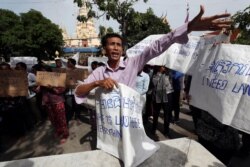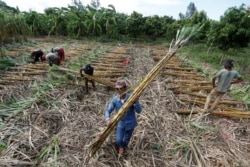In a landmark decision for the rights of smallholders, a leading Australian bank has agreed to pay more than 1,000 Cambodian families displaced by a sugar company it granted a loan to in 2011, even though the loan violated the bank’s stated human rights standards.
ANZ Australia will pay the families with interest earned by the $40 million loan to Phnom Penh Sugar (PPS), a company owned by a conglomerate headed by Cambodian lawmaker and tycoon Ly Yong Phat, who is affiliated with the ruling Cambodian People's Party (CPP).
At the time ANZ granted the loan through its Cambodian joint venture, ANZ Royal Bank, PPS had attracted international media attention following widespread allegations of its use of child labor and clashes with local human rights groups.
PPS did not respond to VOA Khmer’s requests for comment.
At the heart of the dispute was the 2011 eviction of farm families, who allegedly received no compensation when PPS purportedly seized their holdings and homes in collusion with local authorities and Cambodia’s armed forces. At the time, plantations owned by Ly Yong Phat were spread across the Tbpong and Oral districts. They eventually occupied 23,000 hectares.
Critics said his operations produced “blood sugar,” because of the violent forced evictions and other human rights abuses inflicted on the families.
'Huge difficulties'
Soeung Sokhom, a representative of the affected families in Cambodia’s Kompong Speu province, said he supported the outcome in a statement issued as part of the payment announcement.
“We have experienced huge difficulties with our livelihoods since the sugar company took our land almost 10 years ago, and this contribution will greatly help our situation,” he said. “The whole affected community, including me, are deeply grateful that ANZ has resolved our complaint.”
The bank did not disclose the exact amount it would pay the farmers, whose holdings varied in size.
The agreement came five years after two nonprofits filed a complaint against the bank with a little-known entity within Australia’s treasury department, the nonjudicial Australian National Contact Point (ANCP). It oversees complaints about the behavior of Australian companies overseas based on guidelines for responsible corporate behavior set forth by the Organization for Economic Cooperation and Development (OECD).
Equitable Cambodia (EC), a nonprofit that since 2012 has worked to protect “all Cambodians from a protracted land-grabbing crisis,” filed the complaint.
Inclusive Development International (IDI), a U.S. nonprofit based in Asheville, North Carolina, joined EC in filing the complaint.
After filing the complaint, the two nonprofits had consistently called on ANZ to divest the profit from the loan and provide it to the families as reparations for their due diligence failings.
'Difficult to reconcile'
In a 2018 report, the ANCP found “there is some doubt in this case around the extent to which ANZ’s actual business practices aligned with its stated approach to human rights. … It is difficult to reconcile ANZ’s decision to take on PPS as a client with its own internal [human rights] policies.”
In October 2018, the bank’s CEO, Shayne Elliott, told an Australian parliamentary committee this was “a dreadful situation” and that the bank would consider compensating the families.
ANCP negotiated the agreement, with talks continuing until earlier this month.
In a joint statement issued Thursday with EC, Natalie Bugalski, IDI’s legal director, said, “This agreement sets an important precedent for the banking industry, and we welcome ANZ’s leadership in this regard. Going forward, all banks should recognize that they can’t look the other way when they loan money to corporations that abuse people’s rights and cause harm. If a bank contributes to adverse human rights impacts through its lending activities, it has a responsibility to contribute to a remedy.”
David Pred, IDI’s executive director, told VOA Khmer by phone that the nonprofits and ANZ would continue to work “with the affected communities to identify the beneficiaries of this payment, the people who are affected by the Phnom Penh Sugar project, and ensure that all of these families receive the benefit of this agreement.”
He described the amount the bank will pay as “significant.”
In a statement by the three parties that was attached to the ANCP resolution, ANZ “acknowledges that its due diligence on the project funded by its loan was inadequate and recognizes the hardships faced by the affected communities.”
"We congratulate Shayne Elliott and ANZ for doing the right thing by returning the revenue earned from the loan to affected families in Kampong Speu," said Eang Vuthy, EC’s executive director. “This is an important recognition of the ongoing hardships that the communities have suffered all these years, and it will make a big difference for them. But this does not in any way replace Phnom Penh Sugar’s responsibility to fully compensate the communities for their damages."
ANCP praised the agreement in an accompanying statement:
“Where a company has gained revenue in a manner inconsistent with the OECD guidelines, and that has resulted in parties being impacted, the payment of the revenues to those parties may be one way a company can comply with the requirements of the OECD guidelines.”
'Appalling record'
Pred pointed out, “This is only the second time out of more than 300 cases concluded in the 20-year history of the National Contact Point system when a complaint process has resulted in a concrete financial remedy for complainants. That’s an appalling record.”
He continued, “We hope this outcome will help inspire a brighter future for corporate accountability, where the victims of corporate misconduct can expect legitimate complaints to result in effective remedies.”
As part of the resolution, ANZ also agreed to review and strengthen its human rights policies, including its customer social and environmental screening processes and grievance mechanism.
“We look forward to working with ANZ to establish an accessible and effective grievance mechanism for affected communities, and we urge other banks to follow suit,” Pred said.
Last year, Friends of the Earth Australia issued a report finding Australia’s largest banks, including ANZ, the Commonwealth Bank, NAB and Westpac, had funded directly or indirectly companies accused of improperly acquiring land from local people, child labor violations and land clearing, according to The Sydney Morning Herald.
Phong Sokit of Kampong Speu province told VOA Khmer that the sugar company had seized about 25 hectares of land he had owned since 1996 in the Oral district. He said he had not heard about the compensation plan.
Today, each hectare is worth about $10,000, he said.
“I don’t know how they will solve how much to pay people," Phong Sokit said. "Some have five hectares, some have 10 hectares that were bulldozed and grabbed. Some people have two or three hectares. … If the plan is to pay each an equal amount, I cannot accept it. Those who have more hectares of land can’t accept it.”
Phong Sokit added, “It’s not clear yet what’s going to happen because the representatives who went to the meetings have not come back to tell the communities.”






